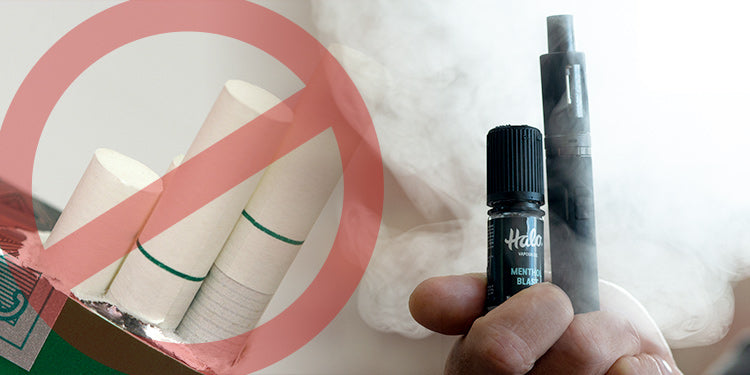
Menthol Cigarettes Banned This Week - What It Means For Vaping…
It’s strange how sometimes something really big can creep in with barely a whisper.
An example of this is an upcoming ban on menthol cigarettes, which will be banned in the UK and the EU from May 20th 2020 - yet many smokers have still not heard of the ban.
The impact could be huge - while estimates vary, there could be as many as 1.3 million people in the UK who suddenly will not be able to (legally) obtain nicotine in their preferred choice of cigarette.
More smokers will switch to vaping - but could there be a cost?
While it’s impossible to predict how many smokers will switch to electronic cigarettes, we can get a rough idea of what might happen.
A survey of 1000 smokers by Vape Club found that 18% of menthol smokers planned to start using electronic cigarettes to replace menthol cigarettes. But data from Ontario, which implemented a menthol ban in 2017, shows that what people say and what people do can be quite different.
In Ontario, 6% of menthol smokers predicted that they would try alternative flavoured products such as e-cigarettes or cigars. But when the ban came into place, the actual number was 29%. If this pans out in the UK, we could see huge numbers of smokers switching to vaping.
This could come at a cost, though. The New Nicotine Alliance, a charity that advocates for alternative nicotine users, believes that one of the reasons vaping has been so effective is because it has been a choice for smokers, rather than something that has been forced on them. If smokers feel coerced, the organisation believes vaping could become a less effective solution for them.
Barriers to switching to vaping
In a completely free market, you’d expect to see menthol vape adverts plastered everywhere.
Under EU regulations, however, most advertising channels for vape companies are banned. Vape companies are also effectively banned from making health claims about their products.
That limits the options for vape companies to persuade menthol smokers to try vaping, especially with thousands of UK vape shops now closed under the coronavirus lockdown.
Still, everyone’s heard of vaping, and the options are there for people who want it. Smokers can even gain access to vapes via many stop smoking services, many of which are now vape-friendly.
Unfortunately, and despite the best efforts of the UK government, charities such as Cancer Research and advocates, many smokers now believe that vaping is as bad as or worse than smoking. Much of that is due to misinformation coming from the USA, which reached a peak last year when a lung disease in the USA caused by illicit cannabis vaping was wrongly attributed to nicotine vaping.
That perception will undoubtedly stop some menthol smokers from switching to vaping. After all, there are other options…
The illegal black market tobacco will grow
One beneficiary of the ban is likely to be the black market.
Illicit tobacco is already huge. We don’t know just how huge - as the numbers are controversial and the issue is highly political. Those lobbying for tax increases need to argue that it doesn’t just force people to buy tobacco illegally, while those fighting against tobacco duty hikes will want to highlight the damage they can do.
But one-stop smoking service in a UK coastal area told me that almost all of their clients used black market cigarettes, which were typically even cheaper than vaping. Indeed, when we surveyed 500+ smokers and ex-smokers back in 2012, almost two-thirds said they had purchased cigarettes illegally.
This number is likely to grow with a menthol ban, reducing the numbers of smokers switching to vaping. A 2011 study (albeit one that was commissioned by the tobacco industry), argued that a menthol ban would create a black market in menthol cigarettes nearly equal to that of the legal menthol market. Still, vaping had yet to make its mark in 2011 and the Ontario study (albeit a tobacco control study) didn’t find any immediate increase in contraband cigarettes.
Conclusion
Despite barriers, there’s a huge opportunity for both public health and the vape industry.
If you are a smoker and you’re worried about the risks of vaping, a key message is to seek out the advice from UK scientists and experts, including that from government body Public Health England and charity Cancer Research UK. These organisations will provide you with balanced, unbiased advice on vaping - and ignore the often contradictory and hysterical headlines from tabloid media.
If you’re a vape company, buckle up and make sure you’re well stocked - you could be about to sell a lot of menthol e-liquid…
Sources
Almost half a million smokers will quit as a result of the menthol ban, study reveals, Talking Retail, May 2020
Estimating Consequences of a Ban on the Legal Sale of Menthol Cigarettes, Compass Lexecon January 19, 2011 (PDF)
Evaluation of Ontario’s Menthol Ban, OTRU, March 2018 (PDF)
IQOS opens up to independents as menthol cigarette ban looms, Talking Retail, Jan 2020